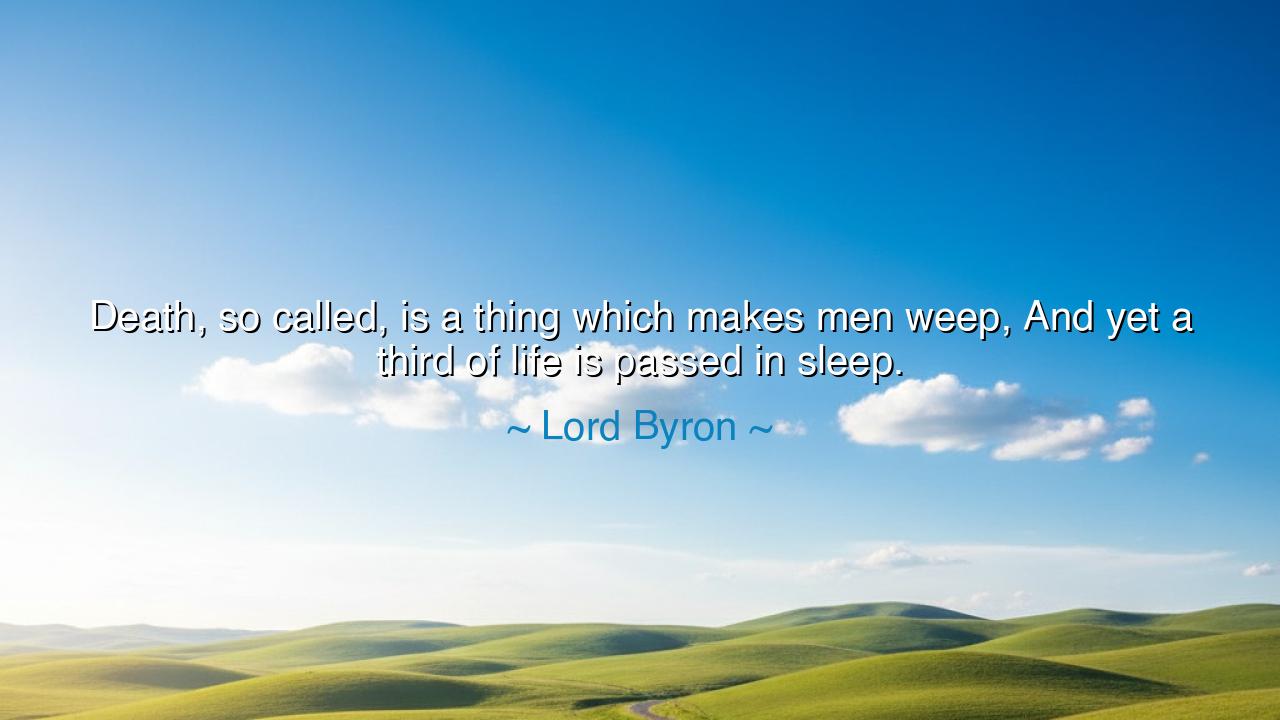
Death, so called, is a thing which makes men weep, And yet a
Death, so called, is a thing which makes men weep, And yet a third of life is passed in sleep.






The words of Lord Byron, “Death, so called, is a thing which makes men weep, and yet a third of life is passed in sleep,” carry within them the music of paradox and the depth of timeless reflection. It is a line both haunting and profound, a mirror held up to the strange contradictions of human existence. For Byron, who wandered the world as both poet and pilgrim, death was not merely an end—it was a mystery to be understood. In this saying, he draws a thread between death and sleep, suggesting that the two are closer kin than we dare admit.
From the dawn of civilization, men have trembled before the shadow of death, as though it were an abyss from which none return. Temples were built, prayers were uttered, and songs were sung in defiance of its silence. Yet every night, without resistance, we surrender ourselves to sleep, that soft rehearsal of oblivion. Our bodies lie still, our senses fade, and our minds drift into worlds beyond control. Sleep, like death, claims us—yet we welcome it without fear. Why then do we weep for one and rest in the other? Byron’s words compel us to see that death and sleep are twins of the same mother—rest and renewal—but we, blinded by emotion, have learned to call one a curse and the other a comfort.
Consider how the ancients spoke of these mysteries. In the myths of Greece, Hypnos, the god of sleep, and Thanatos, the god of death, were said to be brothers, born of Night herself. Hypnos brought dreams to weary mortals; Thanatos brought eternal peace. To the wise, these myths were not mere stories—they were teachings. They reminded humanity that life is a rhythm between waking and resting, between motion and stillness. Byron, steeped in the wisdom of the ancients, echoes this truth: that we spend a third of our days in a small, gentle death, and yet we rise again each morning renewed.
In history, many great souls have pondered this same mystery. Marcus Aurelius, the philosopher-king of Rome, often wrote that death is natural, and to fear it is to fear the turning of the seasons. He compared it to sleeping, for in both, the soul finds peace from toil. Even Socrates, when condemned to drink the hemlock, faced his end with serenity, saying, “To die, perhaps, is to dream.” They, like Byron, understood that death is not to be hated—it is part of the grand cycle, the stillness that gives meaning to motion, the silence that deepens the music of life.
Yet Byron’s line also carries a quiet sorrow. It is as though he laments that while we spend so much of life in the unconscious stillness of sleep, we fear the eternal stillness of death. We lose our days without realizing how precious they are. Each night that passes is a small death, a fragment of life surrendered. And when the final sleep comes, many weep not because it is unnatural, but because they did not live fully while they had the chance. The poet’s lament is thus a call to awaken—to cherish every waking hour, to spend less time merely drifting through existence.
To understand death, then, is to understand life itself. Both are parts of the same mystery. Those who live with awareness of death live more fiercely, more passionately, more gratefully. The samurai of Japan meditated on death daily—not to invite it, but to strip fear from the soul, so that each moment of life might burn with greater light. Likewise, Byron’s insight is not morbid but liberating: if death is akin to sleep, then there is no need for terror—only the courage to rest when the time comes, and the wisdom to live brightly until it does.
The lesson, dear listener, is simple yet eternal: fear not the sleep of death, but fear the sleep of the living soul. Do not pass your days half-awake, drifting through habit and weariness. Rise each morning as one reborn from the night’s quiet death. Let gratitude fill your breath, let purpose guide your hands, and let love temper your heart. When your final rest arrives, may it find you not afraid, but fulfilled—knowing that you have lived each waking moment as one who truly understood the balance between life, sleep, and death.
For in truth, death is not the enemy of life—it is its completion. And when you live with that awareness, your nights become peaceful, your days purposeful, and your spirit free.






AAdministratorAdministrator
Welcome, honored guests. Please leave a comment, we will respond soon